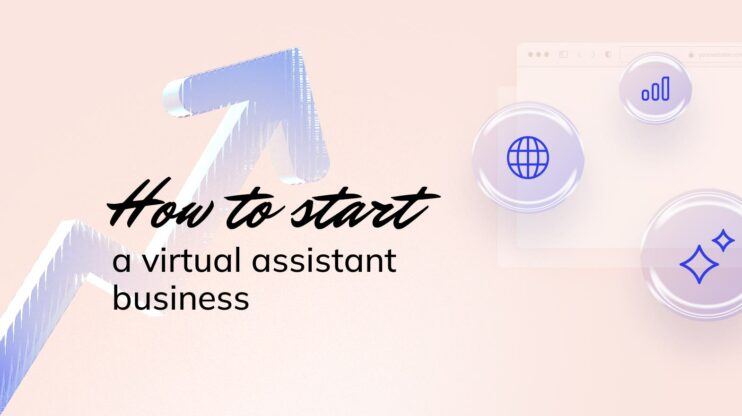Starting a consulting business offers a pathway to using your expertise and providing valuable solutions to clients. How do you deal with the complexities of this industry? This step-by-step guide will help you understand the consulting industry, define your area’s unique prepositions, develop a robust business strategy, and effectively market your services. Follow these steps to learn how to start s consulting business and position yourself for success and growth in the dynamic market.
FAQ
How do I start my own consulting business?
How much does it cost to start a consulting business?
How do I start off as a consultant?
Is business consulting a profitable business?
Stage 1: Understand the consulting industry and set up your business
Starting a consulting business involves understanding the area you’ll be working in. The consulting industry is vast and diverse, covering various fields from management to IT. Also, creating a solid business strategy is essential for launching a successful consulting business.
Step 1: Explore the consulting industry
Here are the main types of consulting you should know about:
- Management consulting: This deals with helping businesses improve their performance.
- IT consulting: Focuses on advising companies on how to use technology to meet their goals.
- Financial consulting: Provides expertise in managing finances, investments, and risks.
- Human Resources consulting: Helps with recruitment, training, and employee management.
The consulting market is growing and offers many opportunities. Besides the mentioned main consulting areas, there are many other consulting fields. Whatever you could think of is now being consulted.
Understanding the field you are consulting in is critical. Identifying a specific area where you have expertise can set you apart. Study your potential competitors to see where you could offer something unique. We will learn how to use this knowledge later on to shape your business strategy and position yourself successfully in the consulting industry.
Step 2: Define your consulting expertise
Before starting your consulting business, it’s important to define your consulting expertise. Knowing your strengths will help you stand out in the market and attract the right clients.
Identify your skills and knowledge List out all the skills, experiences, and knowledge you have. Focus on areas where you excel and have the most experience.
Determine your consulting area Pick a specific area where you can offer specialized advice. Consulting could be anything like IT consulting, marketing, or business strategy.
Understand market needs Research what clients in your consulting area are looking for. This will help you tailor your services to meet their needs better.
Assess your competition Look at other consultants in your consulting industry. Identify what they offer and find ways you can provide additional value.
Define your unique selling proposition (USP) Find what makes you different. It could be a unique method, a specific client focus, or additional services that make you stand out.
By defining your consulting expertise, you position yourself to provide focused, high-value services to your clients. This not only enhances your professional credibility but also increases your chances of success in the consulting business.
Step 3: Create your business plan
Your business plan should outline your goals, the services you will offer, and your target market. Start by identifying the problems your consulting services will solve and the types of clients you will serve.
- Provide a brief overview of your business concept, objectives, and mission.
- Include research on your industry, market size, and competition.
- Describe the consulting services you will provide and how they benefit clients.
- Outline how you will attract and retain clients, including online and offline methods.
- Estimate your startup costs, revenue streams, and profitability.
This plan serves as a roadmap and is also crucial if you are seeking funding.
Step 4: Set up a legal structure
Choosing a legal structure impacts your taxes, liability, and legal responsibilities. The most common structures are sole proprietorship, partnership, LLC, and corporation.
- Sole proprietorship: Easy to set up but offers no personal liability protection.
- LLC (Limited Liability Company): Provides liability protection while allowing flexible management and tax benefits.
- Partnership: Ideal if you are starting with one or more partners.
- Corporation: Offers the most protection but involves more regulations and complex tax requirements.
Consulting with a lawyer or accountant can help you choose the best structure for your business.
Step 5: Select a business name
Picking the right business name is important for branding and marketing (which we will discuss later in the article). Your name should be unique, easy to remember, and reflective of the services you offer.
Ensure that the name gives potential clients a hint about your consulting focus. Search for available domain names and check with your state’s Secretary of State to make sure the name isn’t already taken. Consider registering the name as a trademark to protect your brand.
A well-chosen business name helps establish your identity in the marketplace and sets you apart from competitors.
Step 6: Develop your fee structure
Your fee structure will show clients your value and fit their budgets. You have different options such as hourly rates, project-based fees, and pay-for-performance pricing.
Hourly rates are simple and clear. You charge clients for each hour of work. This way, they know what each part of the project costs. However, it might not show the full value of your service.
Project-based fees work well for specific deliverables. You set a fee for the whole project. This is beneficial if a project has a well-defined scope and clear results.
Pay-for-performance is linked directly to results. For example, you might charge a percentage of sales increase due to your help. This model works well if you can measure outcomes and feel confident in achieving them.
Stage 2: Find your target market and market your consulting service
After understanding the basics of a consulting business and choosing your specialization, you can focus on identifying the target market for your marketing efforts. Identifying your ideal client helps you tailor your services and reach those who need your expertise.
Step 1: Identify your calling
Determine which industry or field you have the most experience and knowledge in. This could be small businesses, technology firms, healthcare, or other areas. Your background will help you understand the specific needs and pain points of your potential clients.
Step 2: Research the market needs
Understand what your target market is looking for. Are they seeking advice on improving operations, marketing strategies, or financial management? This research helps you customize your services to address these specific requirements.
Step 3: Define your ideal client
Create a profile of your ideal client. Consider factors like company size, industry, location, and budget. Knowing who you want to work with makes it easier to find and attract them. Identify common challenges that your target market faces. For example, small businesses might struggle with scaling operations or managing finances. Offering solutions to these pain points positions you as a valuable resource.
Step 4: Develop a value proposition
Set to articulate the benefits of your consulting services clearly. Define how you can solve the customers’ problems and improve their business. This could be through increased efficiency, higher sales, or better customer retention.
When learning how to start a consulting business, having identified the target details is crucial to start the marketing process.
Stage 3: Reach your consulting business to your target
After learning how to start a consulting business is to market it to your target audience. The key to effective marketing for your consulting business includes establishing a strong brand identity, using digital marketing tools, and leveraging networking and referrals to gain clients.
Step 1: Branding and identity
Your brand is the face of your business. It includes your logo, business name, and overall image you present to clients. Make sure to spend time creating a logo and selecting the right colors and fonts that represent your business. Use business cards to spread your brand wherever you go.
Consistency is key. All your materials, from your website to your social media profiles, should have the same look and feel. This helps build recognition and trust with potential clients. Remember, a strong brand sets you apart from competitors and communicates the value you provide.
Step 2: Create a website
Using digital marketing tools can significantly boost your online presence. To build a good foundation for your consulting business, start with a website. It should be easy to navigate and clearly state what services you offer. SEO (search engine optimization) will help your site rank higher in search results, so more people can find you.
Create your custom online store in minutes with 10Web AI Ecommerce Website Builder and take your business online. 
Looking to sell online?
To create your personalized consulting website, consider 10Web’s AI Website Builder, which will create your website in seconds based on the prompt and description you give. The 10Web AI Website Builder for business consultants streamlines the creation of professional websites by automating the design and customization process. You can quickly launch a site fitting your consulting services, enhanced by AI-driven SEO optimization for improved visibility, all without needing any technical expertise.
Step 3: Use social media platforms
Social media platforms like LinkedIn and Twitter are great for connecting with potential clients and sharing valuable content. Consistent posting on these platforms builds your authority in the field. Email marketing, through CRM (customer relationship management) systems, can help manage and nurture your client relationships. Consider engaging in blogging, podcasting, or hosting webinars to showcase your expertise and reach a wider audience.
Step 4: Networking and referrals
Networking is crucial in consulting. Attend industry conferences, workshops, and meetings to meet potential clients and other experts. Joining professional associations can also provide valuable networking opportunities. When networking, always have your business cards ready to hand out.
Building relationships with other professionals can lead to referrals. Satisfied clients can also refer your services to their friends and colleagues. Encourage this by maintaining clear and open communication, providing excellent service, and thanking clients for their referrals.
Strong public relations consulting can enhance your reputation and visibility, too. Write articles, give talks, and participate in community events to grow your network.
Step 5: Invest in operations
Starting a consulting business requires setting up solid operational foundations to ensure smooth day-to-day operations, which will also affect how the customer perceives your offering.
- Select tools for your daily operations. Use video conferencing software like Zoom for client meetings and Slack for team communication.
- Organize your finances. Open a business bank account and get a business credit card. Use accounting software to track expenses and revenue.
- Develop HR policies. If you plan to hire staff, create HR policies. Decide between hiring employees, freelancers, or contractors based on your needs.
- Set up your workspace. Create a productive workspace. Whether it’s a home office or a rented space, ensure you have everything you need to work efficiently.
Establishing strong operational foundations will help streamline your business activities and support growth.
Step 6: Create proposals and contracts
Proposals and contracts will formalize your work agreement with clients. Each proposal should start with an overview of the problem you’re going to solve and how your skills specifically address it.
Include a clear scope of work section. This defines all tasks and deliverables. Clients need to know exactly what they will get for their money.
Next, list your fees and payment schedule straightforwardly. Break down your costs if needed, so clients understand what they’re paying for. For example, if you’re using project-based fees, list key milestones and the corresponding payment amounts.
Add in legal terms to protect both you and your clients. Terms about confidentiality, termination, and liability are essential. Both parties should sign the contract to make it legally binding.
Using these techniques will help ensure you have clear and professional agreements with your clients, making your consulting business more reliable and trustworthy. After creating this proposal, you can try to sell them through the above-mentioned marketing tools.
Tips for mastering client relationship management
When you’re starting a consulting business, building strong relationships with your clients is essential. Here’s how you can master client relationship management:
- Get to know your clients’ specific needs and pain points. Listen carefully, ask questions, and show genuine interest. This helps you offer tailored solutions and become a trusted advisor.
- Keep communication clear and frequent. Update clients on progress, challenges, and successes. Use tools like email, phone calls, and video meetings to stay connected.
- Deliver high-quality work that meets or exceeds expectations. Consistency in your performance builds trust and secures long-term relationships.
- Regularly seek feedback from your clients. This helps you improve your services and shows clients that you value their opinions. Use feedback to make necessary adjustments.
- Happy clients can lead to referrals. Encourage satisfied clients to refer your services to others. Offer incentives for referrals to motivate them even more.
- Implement customer relationship management (CRM) tools to track client interactions, manage relationships, and streamline communication. CRM tools can help you organize client information effectively.
- Always be on the lookout for new clients. By maintaining a pipeline of potential clients, you ensure a steady flow of work and reduce the risk of downtime.
- Keep your existing clients happy. Retaining clients is often more cost-effective than acquiring new ones. Provide ongoing support and stay engaged to build loyalty.
By paying attention to these steps, you’ll be well on your way to mastering client relationship management in your consulting business.
Conclusion
Learning and starting a consulting business is rewarding. It allows you to use your expertise to provide valuable solutions to clients. By understanding the consulting industry, defining your unique propositions, developing a robust business strategy, and effectively marketing your services, you can position yourself for success in this dynamic market.
This guide has outlined the essential steps from setting up your business, defining your expertise, and creating a business plan, to marketing your services, managing operations, and building strong client relationships. Follow the steps for building your consulting business from scratch.
Create your custom online store in minutes with 10Web AI Ecommerce Website Builder and take your business online. 
Looking to sell online?














